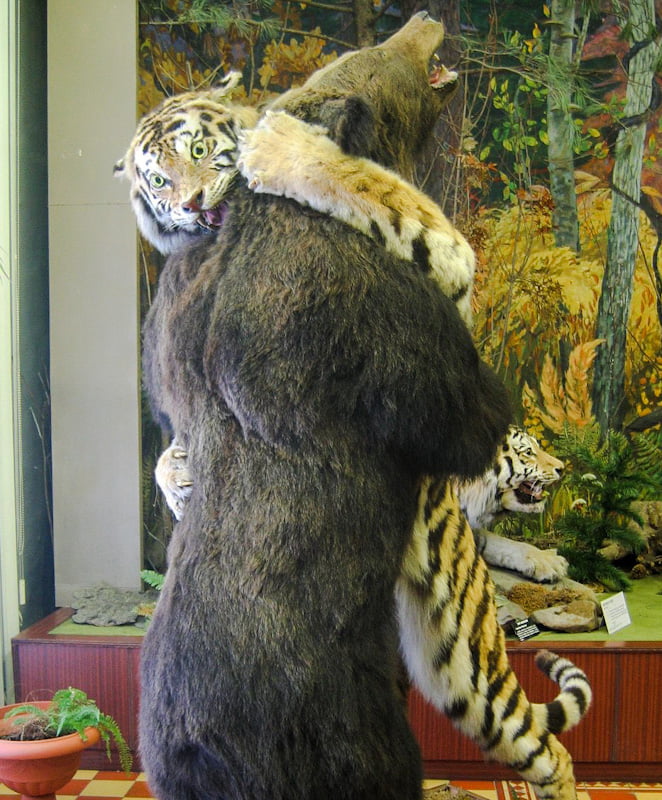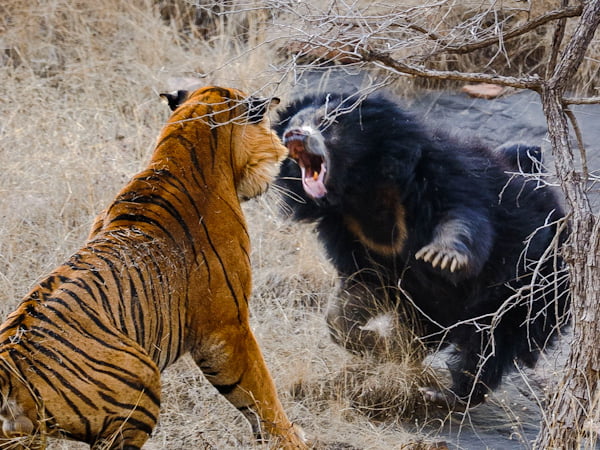Do tigers kill bears? Yes, tigers do kill bears but it will happen quite rarely although there is conflicting information on the frequency of bear/tiger encounters. I’m going to quote a section of the best book on wild cats1, which provides reliable information in answering the question in the title. I have added information from many other sources and applied common sense. Do tigers prey on bears? Yes, but rarely and when pushed to do so because of a scarcity of usual prey animals (see below). There are good reasons why on occasions tigers might avoid bears and vice versa.
“Feeding ecology: tigers will eat almost anything they can catch, from frogs to elephant calves. The menu includes birds, fish, mice, locusts, porcupines, moose, and monkeys but these animals generally form an insignificant part of the tiger’s diet.
There are also records of tigers killing and eating other carnivores, such as bears, leopards, lynx, wolves, and foxes but this is not a common occurrence either.”
Amur tiger
It is the Siberian tiger which is more likely to come into contact with bears to attack and kill them (I would argue). Apparently, between 1944 and 1959, 32 cases of Siberian tigers attacking brown and Asian black bears were recorded in the Russian Far East, the home of the Siberian tiger. Bengal tigers also come into contact with bears in places such as the Ranthambore Tiger Reserve in Rajasthan, India.
Brown bears live in the open more than Asian black bears and are not able to climb trees and therefore they are attacked more readily by Siberian tigers.
The Wikipedia authors also state that tigers can tackle bears larger than themselves. They do so through their ambushing technique; jumping on the bear from an elevated position. It is said that tigers mainly feed on the fat deposits of the bear on the back groin and hams.
Siberian or Amur tigers do prey on adult brown bears and young bears but the percentages are low: 1.4% of the Siberian tiger’s annual diet is of Ussuri brown bears while 0.7% of their diet is made up of the smaller Asian black bear.
It is said that bears sometimes follow tiger tracks so that they can scavenge from tiger kills and to prey on tigers themselves. Although I am sure bears normally avoid tigers. Bears sometimes steal tiger kills and therefore the tiger’s presence is not altogether a bad thing for the bear.
Study
It appears that an interesting study took place in the Sikhote-Alin region of Russia’s Far East (a protected area) in which 44 direct confrontations between bears and tigers were recorded. During these confrontations bears were killed 22 times and tigers 12 times. It could be said, therefore, that tigers in general win a tiger versus bear fight.
A report dated 1973 records the killing of tigers (including adult males) by brown bears. In all cases the bears ate the tiger.
I cannot vouch for the information provided on Wikipedia but the authors do refer to references in all cases. It is quite clear that the answer to the question, “do tigers kill bears?” is an emphatic, Yes. And encounters are not that rare in the Far East of Russia, judging by the records, which is where you will find Siberian tigers. Siberian tigers are the largest subspecies of tiger and the largest cat in the world.

Postscript
I feel I need to add a postscript to this page about three years later. Although there are records as mentioned above of Siberian tigers killing bears and indeed Bengal tigers killing bears, there are easier prey animals for tigers to kill. Therefore, I would suggest that bears are not a priority. They are de-prioritised and sometimes they may be a last resort. This is because of the dangers of killing a very large animal which can inflict serious injury on a tiger. A seriously injured tiger may no longer be able to hunt which will lead to starvation.
Sloth bear wins fight
I have written about a sloth bear with her young on her back defeating 2 tigers in a fight. This brings in home: this is a pretty even fight and tigers don’t get involved in even fights unless circumstances demand it.

Fitness and age a factor
There is also the issue of the age of the tiger and whether they are fit. And the age and health of the bear. What I’m pointing to is that an infirm or old tiger won’t attack a bear in my view. And often tigers will attack young bears and smaller females for obvious reasons.
It should also be said that in the Russian Far East wild pigs and red deer form the bulk of the tiger’s diet. Together they constitute 60 to 84% of tiger kills. And when they are short of normal prey animals during for example severe winters tigers will even go into remote villages to kill dogs. The point, there, is that when desperate for prey they will go for domestic stock such as cows and horses and domestic animals rather, perhaps, then attacking a bear.
Huge sloth bear kills Bengal tiger?
The Times of India reports on April 17, 2019 the possible killing of a Bengal tiger by a large sloth bear. They found a dead tiger in a waterhole in Dudhwa National Park. The officials suspected that a sloth bear was the killer. Photographs of a huge sloth bear were picked up by camera traps about 150 m from the spot where the tiger was killed. The bear had a few scratches on its face but was moving without difficulty.
The tiger had neck and head injuries consistent with an attack by a bear. The autopsy report stated that the tiger was killed by a large carnivore but did not specify the predator.
If they are correct, bears that are not the largest species can kill tigers. This reinforces my view that tigers have to be desperate to attack a bear as a prey animal. In this instance the bear and tiger met at a watering hole and it appears that the bear defended their position. The fight was thrust upon them. The male tiger was called Matkasur and was therefore known to the authorities.
Expert’s view
Sergey Aramilev, a biologist and the head of the Amur Tiger Center knows a bit about tigers killing bears. He makes it clear that tigers do kill bear sometimes. He even says that tigers sometimes bite through the tree trunk of a soft tree less than 20 cm in diameter to fell the tree in which a bear might have escaped.
He also states that if a large male bear fights a tigress or a small male tiger the fight will be 50-50. The outcome may even favour the bear. But if they are equally matched in terms of being fit and adult and males then he suggests that most often the Tiger will win. He says it’s because tigers are accustomed to killing. Tigers only eat meat and bears are omnivores. Tigers have developed better hunting skills. It knows where to bite to kill its victim. Bears normally scavenge and are mainly vegetarian and do not hunt regularly. These factors favour the tiger under appropriate circumstances as mentioned.
Note 1: Wild Cats of the World page 351. ISBN-13: 978-0-226-77999-7


